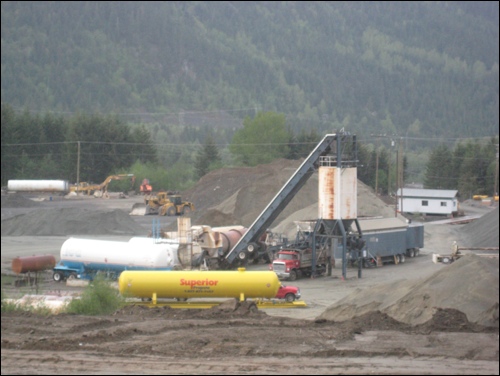“Something is rotten in the state of Denmark” – Hamlet Act 1, Scene 4,
Something’s rotten in the state of Whistler and the stench is emanating directly from municipal hall and the illegal asphalt plant operating in the Olympic Athletes Village.
If Whistler’s mayor has his way, post-Olympic tourists will soon be flocking to Whistler to visit its newly expanded 60-acre basalt quarry, logged old growth forests and the world’s first Olympic legacy asphalt plant, as the resort positions itself as a key player in the mineral extraction business.
In my last post, I compared Whistler’s Athletes Village asphalt plant fiasco to the 1970’s Love Canal catastrophe in New York State. Well, there’s a lot of “love” flowing these days (about $400,000 worth), between Whistler’s mayor, the Chief Administrative Officer, city council and the owner of Whistler Aggregates and Alpine Paving, Frank Silveri.
This love affair has become so intense that all parties involved are willing to alienate the several hundred families moving into Whistler’s newest residential community, Cheakamus Crossing, to protect their personal interests.
At Tuesday night’s council meeting, Whistler councillors admitted that the plant operator, Frank Silveri never received proper zoning permits to allow for asphalt processing. Instead of kicking him off the property and facing the music, elected officials continue to defend Silveri’s business interests, putting the community’s health at risk.
The RMOW should be closing the plant full-stop, not rezoning the area to make it a permanent permitted use, beside a full-time neighbourhood filled with families and kids.
As Councillor Eckhard Zeidler pointed out, “asphalt plants by their very nature need to move from place to place, even though Whistler’s looks like it’s bolted down by carbon fibre bolts and is never moving.”
Surprise August council meeting
Council meetings are typically scaled back or cancelled in August for summer holidays. Instead, Whistler’s council scheduled one of its most controversial meetings the day after the BC Day long weekend. Coincidence? I think not.
The August 3rd council meeting included first and second reading for the rezoning that would allow for a temporary, mobile asphalt plant to become a permanent fixture, situated less than 400m from Whistler’s newest neighbourhood. The proposed bylaws would also allow for a 33-acre expansion of the adjacent quarry – double its current size. This second item wasn’t even on the books.
The 33-acre proposed quarry expansion includes lands currently labeled PAN 1B and PAN 2 (designated for preservation/conservation) under the RMOW’s Protected Areas Network, and includes significant tracts of old growth and mature forest, rare plant species and ecological communities and a wildlife connectivity corridor. PAN hasn’t even been legislated – yet another reason for council not to rush these rezoning applications. Even the RMOW’s own Environmental Stewardship Manager recommended against the quarry expansion.
The quarry expansion would also see the removal of 300-year old trees. Turns out that Whistler lacks a tree removal bylaw, so there’s no requirement to monitor these protected areas. Our green mayor was also insistent that a full environmental assessment is not required and that the initial environmental review (or IER) prepared by Cascade Environmental will do nicely, thank you.
Nothing green about Whistler except the money
Am I the only person who is tired of Whistler’s mayor travelling the world to preach about Smart Growth, the Natural Step principles, and how “green” Whistler is?
Whistler’s highest-level policy (Whistler2020) clearly states the vision of our community: “To be the premier mountain resort community — as we move toward sustainability”.
Truth is, there’s nothing sustainable about Whistler these days. In fact, we appear to be moving backwards, as elected officials log old-growth forests and expand industrial areas into residential areas.
The Resort Municipality of Whistler (RMOW) recently launched an update process for Whistler’s Official Community Plan (OCP) — the highest regulatory document that guides the direction of the community, including land use planning and social, economic and environmental plans and policies. The OCP was last updated 16 years ago.
Now is not the time for the RMOW to be making significant decisions about land use planning, such as expanding industry and rezoning natural areas to permanently allow an asphalt plant and doubling the size of a quarry beside a residential area.
How about moving the polluting plant out of the valley, halting the quarry expansion, and preserving the old growth trees in the valley?
While we’re updating regulatory documents, why don’t we establish a tendering process for asphalt, landscaping, legal counsel and environmental consulting fees, so these contracts don’t always end up in the same “conciliatory” hands?
The vote to approve the first and second readings of both by-laws failed in a tie vote, but the rezoning will come back to council in two weeks.
In the ideal world, all of the Cheakamus Crossing residents would band together and have enough money to hire a first-rate lawyer for a precedent-setting class action suit.
Truth is, that many families just can’t afford to walk away from their $20,000 down-payments.
Instead, the fate of these residents and their families now rests in the hands of our ill-informed elected officials and their lasting decisions. However, residents can also sleep easier knowing that the mayor is bringing an element of “certainty” to their lives.
As moving day rolls around, I hope Mayor Melamed doesn’t show up with a countdown cake, balloons and jugs of Koolaid to welcome the new residents. He might find the reception a little frosty.




